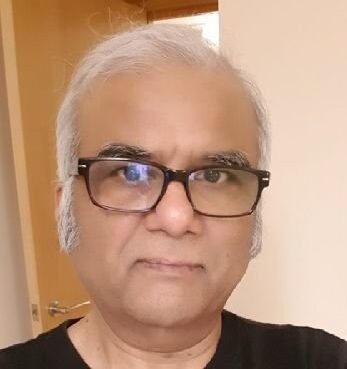
Khalid Umar, originally from Pakistan, is currently a practicing Barrister in the UK. He frequently shares his insights on Indic matters on Facebook with his nearly 20,000 ardent followers.
This article is based on a portion of the YouTube video of Umar’s wide-ranging interview with Citti.Net, titled “Hinduism is intellectually superior.” In this segment, the interviewer asked him to explain the ideological thinking behind doing Azaan on loudspeakers and literally blocking public spaces for namaz five times during the day.
Umar begins by quoting Erdogan, the Turkish prime minister, who apparently has said: “The minarets are bayonets, the mosques are our barracks, their dorms are our helmets, and the believers are our soldiers,” and that the mosque in Europe: “are our Trojan horses.”
Explaining the Islamic perspective on mosques, he says: “You need to understand that the mosque is not a place where you assemble to say your prayers only. It’s a house of God with four walls, which is a powerful political institution, free from state control, which seeks to influence and transform the society at the grassroots level. So, all the mosques are basically houses of Sharia law. They are houses of jihad and stand against everything but [what] secularism stands for.”
A mosque is a country within a country. And the ground upon which the Mosque has been built is now the conquered territory of Islam. It is no longer part of the country where it stands.
“So, to me, a mosque is a country within a country. And the ground upon which the Mosque has been built is now the conquered territory of Islam. It is no longer part of the country where it stands,” he notes, emphasizing that “…you walk by a mosque, be that in Mumbai, or Europe or the United States or London, wherever the land upon which the mosque is built, according to the Sharia law, is not no longer part of that country. It now becomes the God’s house; it is the conquered territory of Islam.”
“So, what happens is that the areas and the roads around the mosque become regions of special interest. Creating nuisance on roads and noise pollution basically discourages the other communities … to leave those properties and sell them off, maybe cheaply, to Muslim buyers.”
He then addresses the issue of Azaan, the Muslim call to prayer, which is proclaimed five times a day, affirming Islamic beliefs in Allah as the only God and Muhammad as His messenger. While that message, in itself, can be quite intimidating and offensive to the non-Muslim communities, he focuses on its impact on civic life.
Creating nuisance on roads and noise pollution basically discourages the other communities … to leave those properties and sell them off, maybe cheaply, to Muslim buyers.
The increasing number of mosques and Muslims in urban areas has raised concerns about the intrusion of Azaan noise. The Muslim community should consider if the traditional approach is still necessary. In the past, strong voices may have been required to reach the faithful, but technology now provides more efficient alternatives, such as mobile apps and wristwatches. A civic-minded Muslim community would look into these modern options to fulfill the purpose of the Azaan more efficiently and without intrusion. However, this is not likely to happen anytime soon. “Because this is… the supremacist ideology that we are talking about. It’s less to do with the call to prayer,” he says.
It is surprising that certain mosques in the UK have been granted permission to use loudspeakers for the Azaan, especially around the Ramadan time, says Umar. It’s not just about the Azaan itself; it’s about the Islamic fixation on tradition, a fixation he calls “illogical.” Then there is the tradition of performing the Azaan for a newborn immediately after birth, which Umar also terms “illogical.” The practice is prevalent even in Western European hospitals, where, in the absence of a mullah, a Muslim doctor or paramedic will volunteer to perform this religious service. “Does it make any sense?” asks Umar.
There should be a meaningful internal debate within the Muslim diaspora to consider important changes to their traditional practices. He emphasizes community-driven change rather than external imposition through executive orders or court mandates. The change, he believes, will be more acceptable to the community if it comes from within the community.
Khalid Umar – Brief Biography
Growing up In the late 1970s in the Punjab province of Pakistan, Khalid Umar recalls that his school education emphasized the supremacy of the Islamic faith over all else, often portraying Hindus as wicked, constant enemies of Islam and their religion as promoting bad values. Muslims were described as historically tolerant, having ruled the Indian subcontinent for a millennium without forcibly converting Hindus.
After General Zia-ul-Haq’s rise to power in the late 1970s, the educational system became increasingly Islamist. According to Umar, even today, many Pakistanis perceive Hindus as being connected to those who lived in Mecca during the time of Prophet Muhammad, adding religious weight to the animosity against them. This narrative contributes to a sense of holy war, pitting the “kafirs” (non-believers) against Islam.
Umar had the good fortune of being born to educated parents who held a more inclusive view and shielded them from religious indoctrination. This helped him to become a free thinker, unburdened by the prevalent biases and animosities in many Muslim households.






